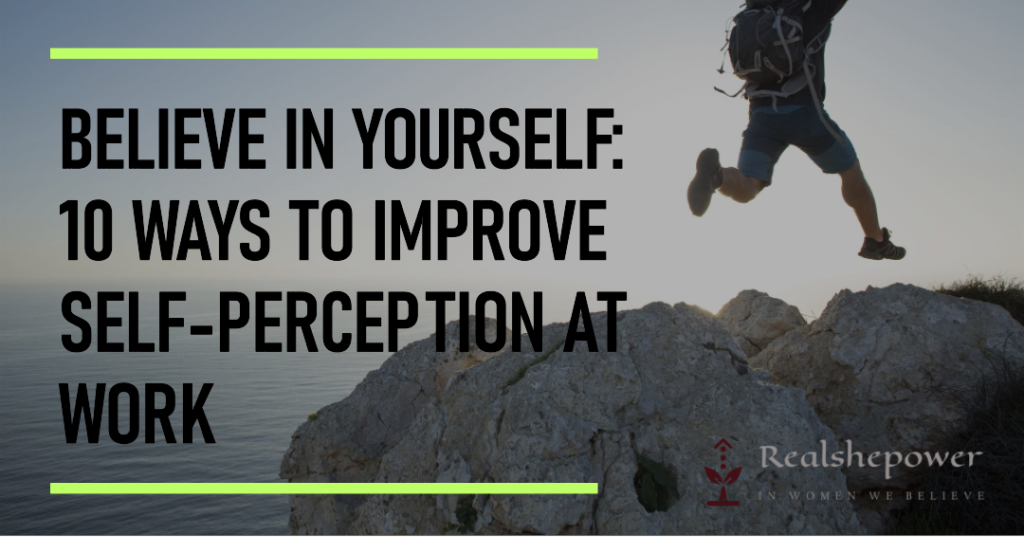The Impact of Self-Perception on Job Performance, Leadership, and Teamwork


In the landscape of professional success, understanding one’s role and capabilities is crucial. An often-overlooked factor in this scenario is self-perception – our personal assessment of our own abilities, strengths, and weaknesses. Our self-perception can influence our performance at work, the way we lead, and how we function within a team. In this article, we’ll delve deep into how self-perception can shape these key elements of our professional lives.
Table of Contents
Understanding Self-Perception
Self-perception is a psychological construct that revolves around how we see ourselves. It includes our beliefs about our skills, talents, and personality traits. Self-perception is deeply personal and subjective, often influenced by a combination of past experiences, feedback, and societal expectations.
In the context of a work environment, self-perception often governs our confidence, ambition, and resilience, all of which are key drivers for job performance, leadership, and effective teamwork.
The Influence of Self-Perception on Job Performance
Our perception of ourselves and our abilities doesn’t just impact how we interact with the world; it also has a significant effect on how we perform in our jobs. Here’s how self-perception impacts job performance:
1. Self-Efficacy: This is the belief in our capabilities to produce designated levels of performance that influence events affecting our lives. Employees with high self-efficacy are more likely to take on challenging tasks and persevere in the face of difficulties. They are confident in their ability to overcome hurdles, resulting in higher levels of productivity and job satisfaction.
2. Goal Setting and Ambition: How we see ourselves plays a large role in what we aspire to achieve. If an individual sees themselves as capable and successful, they are more likely to set ambitious goals for themselves. These high-reaching goals can lead to higher levels of performance as individuals strive to meet their targets.
3. Resilience: Those with a positive self-perception are more likely to bounce back from setbacks, viewing them as opportunities for learning rather than defining failures. This resilience can lead to better job performance over time, as these individuals are less likely to be deterred by challenges.
4. Decision Making: Self-perception can impact an individual’s ability to make decisions. Those who see themselves as competent and capable are more likely to trust their judgment and make decisive choices, a key aspect of job performance in many roles.
5. Interpersonal Relationships: The way we perceive ourselves also impacts how we interact with others. Individuals with positive self-perceptions are likely to build strong, cooperative relationships with colleagues. These positive relationships can improve team performance, leading to a more productive and harmonious workplace.
6. Stress Management: Positive self-perception can help in better stress management. Individuals who believe in their ability to handle challenging situations experience less anxiety and perform better under pressure.
7. Skill Development: Individuals with a positive self-perception are more likely to invest time and effort into further developing their skills, leading to ongoing improvements in job performance.
8. Confidence: Self-perception directly influences our confidence levels. Those who perceive themselves positively exude higher levels of confidence, allowing them to present ideas more effectively, tackle challenges head-on, and command respect in the workplace.
9. Job Satisfaction: Positive self-perception often leads to higher job satisfaction. When individuals feel competent and appreciated, they tend to enjoy their work more and exhibit better performance.
10. Persistence: A positive self-perception encourages persistence. Individuals who believe in their abilities are less likely to give up and more likely to keep trying to overcome obstacles, which can lead to higher levels of job performance.
Understanding the influence of self-perception on job performance can provide valuable insights for both individuals seeking to improve their work output and organizations aiming to boost overall productivity. Promoting positive self-perception can lead to a more engaged, motivated, and high-performing workforce.
The Link Between Self-Perception and Leadership

Leadership involves influencing others to achieve common goals, and the efficacy of this influence is largely dependent on a leader’s self-perception. Here’s how self-perception can shape leadership:
1. Confidence and Assertiveness:
Leaders with a positive self-perception are often more confident and assertive. They are secure in their abilities and are not afraid to make decisions, express their ideas, or defend their viewpoints. This confidence can inspire trust and respect from team members, which is essential for effective leadership.
2. Resilience:
Leadership inevitably comes with challenges and setbacks. Leaders who perceive themselves as capable and resilient are more likely to weather these obstacles without losing sight of their goals. They can maintain a positive outlook and motivate their team to do the same, which contributes to an overall resilient and determined team culture.
3. Empathy and Understanding:
Leaders who have a balanced and realistic self-perception are more likely to understand their own weaknesses and strengths. This understanding often translates into increased empathy for their team members, fostering an inclusive and supportive work environment.
4. Openness to Feedback:
Positive self-perception also involves being open to constructive criticism and using it as a tool for growth. Leaders who perceive themselves as continually evolving are more likely to seek feedback and implement changes, leading to personal and team growth.
5. Ability to Delegate:
Leaders with a strong self-perception understand their own limitations and the strengths of their team members. They delegate tasks appropriately, building on each team member’s strengths, which leads to improved team performance and satisfaction.
6. Risk-Taking and Innovation:
A positive self-perception can also spur innovation. Leaders who are confident in their abilities are more likely to take calculated risks and encourage creative thinking within their teams. This risk-taking and innovative mindset can lead to breakthroughs and advancements in the workplace.
7. Influence and Inspiration:
Lastly, a leader’s self-perception can influence their ability to inspire others. Leaders who view themselves as capable, forward-thinking, and resilient can instill these qualities in their team members. This inspiration can lead to increased motivation, productivity, and overall team success.
Understanding these elements can help leaders cultivate a positive self-perception, which will not only benefit their own leadership journey but also their team’s performance and satisfaction. Self-perception is not static, but rather a dynamic and evolving aspect of our personalities, shaped by our experiences, feedback, and personal growth. Leaders who actively work on improving their self-perception can foster more effective and harmonious teams, paving the way for collective success in the workplace.
The Role of Self-Perception in Teamwork
Understanding one’s role within a group and how to contribute effectively is a central aspect of teamwork. Self-perception can significantly influence how an individual interacts within a team setting, shaping both the person’s contribution and the team’s overall functionality. Let’s delve deeper into the various ways self-perception impacts teamwork.
1. Contribution to Team Goals:
Individuals with a positive self-perception are often aware of their strengths and how these can contribute towards achieving the team’s collective goals. They are more likely to actively contribute ideas and take on responsibilities that align with their perceived strengths. On the other hand, those with a negative self-perception might hold back from contributing due to a lack of confidence in their abilities.
2. Effective Communication:
Self-perception influences how individuals communicate within a team. People with a positive view of themselves tend to be assertive, yet respectful in their communication. They are more likely to voice their opinions and also value the viewpoints of others. In contrast, those with low self-perception may struggle to articulate their thoughts or might overcompensate by being overly assertive.
3. Conflict Resolution:
Conflict is a natural part of any team dynamics. How an individual perceives themselves can shape how they handle disagreements. Those with a positive self-perception can negotiate conflicts constructively, maintaining respect for their own and others’ viewpoints. Those with negative self-perception, however, might either avoid conflict, making it difficult to address issues, or handle disagreements aggressively, leading to further discord.
4. Adaptability:
In a team, adaptability is key. Those with a positive self-perception are more likely to display flexibility, adjusting to new roles or shifts in the team’s direction. This can be attributed to their confidence in their abilities to handle changes. On the contrary, individuals with a negative self-perception may struggle to adapt, potentially hindering the team’s progress.
5. Mutual Respect and Appreciation:
A person’s self-perception can also shape how they perceive and value others. Those with a positive self-perception are more likely to acknowledge and respect the skills and contributions of their teammates, fostering a positive team environment. Those with negative self-perception, however, might feel threatened by others’ abilities, which can lead to tension within the team.
6. Leadership Within a Team:
Even within a team, leadership roles often emerge, and these can be heavily influenced by self-perception. Individuals who perceive themselves as competent and capable are more likely to take on these leadership roles, guiding the team towards its goals. Those with a negative self-perception, however, might shy away from leadership opportunities, missing out on growth experiences and potentially limiting the team’s effectiveness.
In conclusion, self-perception plays a vital role in teamwork. It influences individual behaviors and interactions within a team, impacting the team’s dynamics and effectiveness. A positive self-perception can foster a healthy, collaborative, and productive team environment. In contrast, negative self-perception can create barriers to effective teamwork. Recognizing this connection can guide interventions and training aimed at improving team performance and harmony.
10 Ways To Improve Self Perception At Work

Improving self-perception in the workplace is a multifaceted process. It requires introspection, willingness to change, feedback, and continual learning. Here are some strategies to foster a healthier self-perception at work:
1. Regular Self-Reflection: Make a habit of self-reflection. Take time to understand your strengths, areas for improvement, and how you react to different situations. This practice can give you valuable insights into yourself, thereby shaping a more accurate self-perception.
2. Seek Constructive Feedback: Don’t shy away from feedback, as it can be instrumental in personal growth and professional development. Whether it’s positive feedback or constructive criticism, it can help you understand how others perceive your work and guide you towards improving your skills.
3. Cultivate a Growth Mindset: Embrace a growth mindset, where you view challenges as opportunities to learn rather than obstacles. This perspective encourages resilience, adaptability, and a positive view of your abilities.
4. Engage in Personal Development: Continual learning and development can bolster your self-perception. Attending workshops, webinars, or courses that contribute to your skillset can enhance your confidence and perception of your capabilities.
5. Celebrate Your Accomplishments: It’s essential to acknowledge your achievements, no matter how big or small. Celebrating your accomplishments reinforces your abilities and boosts your self-perception.
6. Practice Self-Compassion: Be kind to yourself when you face setbacks. Understand that everyone makes mistakes, and they are opportunities for growth, not indications of your worth or capabilities.
7. Set Realistic Goals: Setting attainable goals can enhance your self-perception. As you achieve these goals, your confidence in your abilities grows, fostering a positive self-view.
8. Positive Affirmations: Positive affirmations can reshape your mindset and enhance your self-perception. Repeat statements like, “I am capable,” “I am resilient,” or “I am continually improving,” to reinforce a positive self-view.
9. Seek Professional Help: If negative self-perception persists, consider seeking help from a professional counselor or psychologist. They can provide tools and techniques to help improve your self-perception.
10. Promote a Healthy Work-Life Balance: Overworking can lead to burnout, which can negatively impact self-perception. Promoting a balanced work-life schedule allows for rejuvenation and prevents negative self-perceptions from forming due to exhaustion.
Workplaces can also support employees by providing regular feedback, acknowledging employees’ efforts, promoting a healthy work environment, offering professional development opportunities, and fostering a culture of openness and respect.
FAQs:
1. Can self-perception be changed?
Yes, self-perception can be changed. It often involves introspection, seeking feedback, and taking steps to improve one’s skills and capabilities. Therapies like cognitive-behavioral therapy can also be beneficial in altering negative self-perceptions.
2. How can a positive self-perception be cultivated?
Building a positive self-perception involves recognizing and acknowledging one’s strengths, seeking constructive feedback, and setting realistic goals. Celebrating small victories and maintaining a growth mindset can also help.
3. How can workplaces support employees in building positive self-perception?
Workplaces can foster positive self-perception by creating a supportive and non-judgmental environment. Regular feedback, acknowledgement of accomplishments, and opportunities for professional growth can also contribute to positive self-perception.
4. Can self-perception affect mental health?
Yes, negative self-perception can lead to mental health issues like anxiety and depression. On the other hand, positive self-perception can promote mental well-being.
Conclusion
Self-perception is a critical determinant of an individual’s journey within a professional setting. It plays a profound role in influencing job performance, leadership abilities, and teamwork dynamics. Cultivating a positive self-perception, therefore, can be instrumental in fostering professional growth and achieving success in the workplace. It is essential for individuals and organizations to acknowledge the power of self-perception and its impact on various facets of work-life, paving the way for a harmonious and productive work environment.
As we navigate our professional landscapes, understanding and nurturing our self-perception can guide us towards a path of growth, collaboration, and leadership. After all, the way we see ourselves can shape the way we navigate the world.
Read More
You can now write for RealShePower and be a part of the community. Share your stories and opinions with us here.



